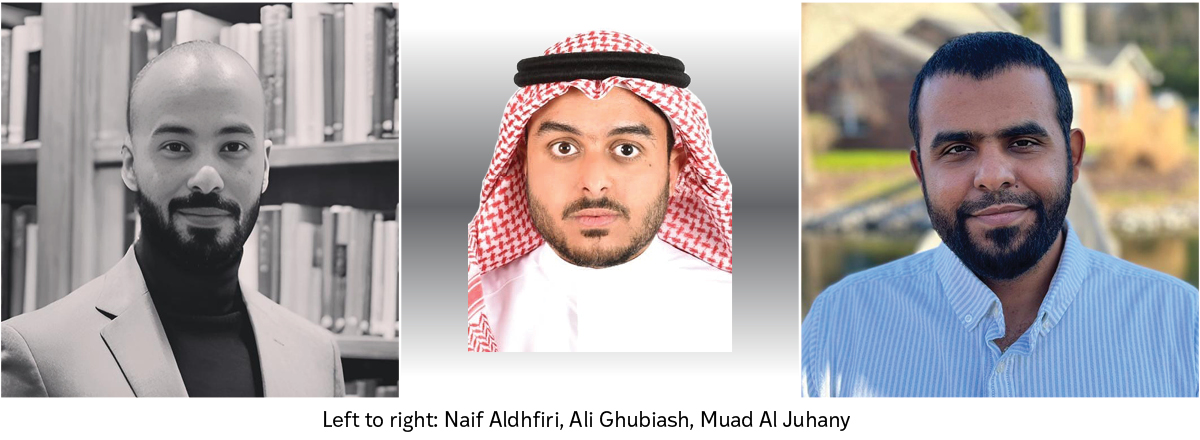A dream that began at WashU Law has grown into a legal tech startup that seeks to transform the legal system in Saudi Arabia. Founded in late 2024, Qaanoon.AI is the work of six co-founders: Muad Al Juhany, JSD candidate; Naif Aldhfiri, JSD candidate; Ali Ghubiash, WashU Engineering alumnus; Abdullah Alomair, PhD; Mohammad Alabdalla; and Mohammed Bamuqabel.
Their combined backgrounds in computer engineering, artificial intelligence (AI), and law led them to a shared mission: making legal knowledge more accessible in Arabic-speaking countries
“Qaanoon.AI is an AI platform that allows users to ask legal questions and receive straightforward answers pulled directly from Saudi laws and legal documents,” said Al Juhany.
Historically, access to legal knowledge has been difficult for citizens of Saudi Arabia. An ever-evolving legal system, combined with the high cost of lawyers, presents a challenge for everyday people who might need to reference the law for common life events like car accidents, divorce, or estate planning.
Some of Qaanoon’s co-founders, including Aldhfiri, Ali, Alomair, and Al Juhany, are faculty members at universities across Saudi Arabia. As educators, they understand the state of legal education across the country and aim to raise awareness about AI and its growing impact on the field.
Qaanoon.AI comes at a pivotal time for Saudi Arabia, as the country continues to undergo legal and regulatory reforms in addition to a rapidly growing AI scene. As part of its Vision 2030 strategy, Saudi Arabia has designated $40 billion for AI-related initiatives. Qaanoon.AI aims to build on that momentum through legal modernization.
“Saudi Arabia is moving fast in legal tech and AI adoption,” said Aldhfiri. “We saw an opportunity to build something local, in our language, rooted in our legal system, that does real good for people.”
Qaanoon.AI is currently available as a free tool for limited personal use. It works similarly to popular tools like ChatGPT or Gemini: Users simply enter their legal queries, and Qaanoon.AI answers them with relevant legal citations in Arabic. A paid version with expanded features is currently in development, along with an enterprise model tailored for law firms and corporations.
“We’re not here to replace lawyers,” Al Juhany said. “We see Qaanoon.AI as a tool that saves them time and energy, while also helping their clients better understand the legal system.”
In contrast to ChatGPT or Gemini, Qaanoon.AI is built from the ground up to support Arabic-speaking users. Most legal AI tools currently on the market have been trained on English-language data, making them less effective in interpreting Arabic legal documents and properly citing Saudi Arabian law.
“Data is everything,” said Ghubiash, who completed his PhD in AI-based security systems. “We’ve spent countless hours collecting, translating, and formatting Saudi Arabian legal documents so our model can learn and reason through them in Arabic. It’s important that our users feel comfortable using the tool and confident in the knowledge they get from it.”
Qaanoon.AI was born at WashU Law, where the founders met through a course on the intersection of law and artificial intelligence. That course gave them the spark and structure to turn their idea into action. Over time, the team hopes to deepen ties with WashU Law through future collaborations, internships, and research partnerships.
“There’s real opportunity here for experiential learning,” Aldhfiri added. “We want to bring WashU students into the company and give them a chance to work on live AI applications with real-world impact.”
Looking ahead, the Qaanoon.AI team is finalizing a five-year roadmap that includes advanced features like deeper case-based reasoning, document automation tools for lawyers, and tailored use cases for common civilian legal scenarios. They’ve already seen early momentum: legal professionals in Saudi Arabia have responded enthusiastically to the tool, and the team is in active conversations about government and regulatory partnerships.
“We met at WashU in this amazing ecosystem and came together around a shared purpose,” said Al Juhany. “Now, we’re seeing that purpose unfold. Qaanoon.AI is about giving people easier and faster access to the law—and we’re just getting started.”
